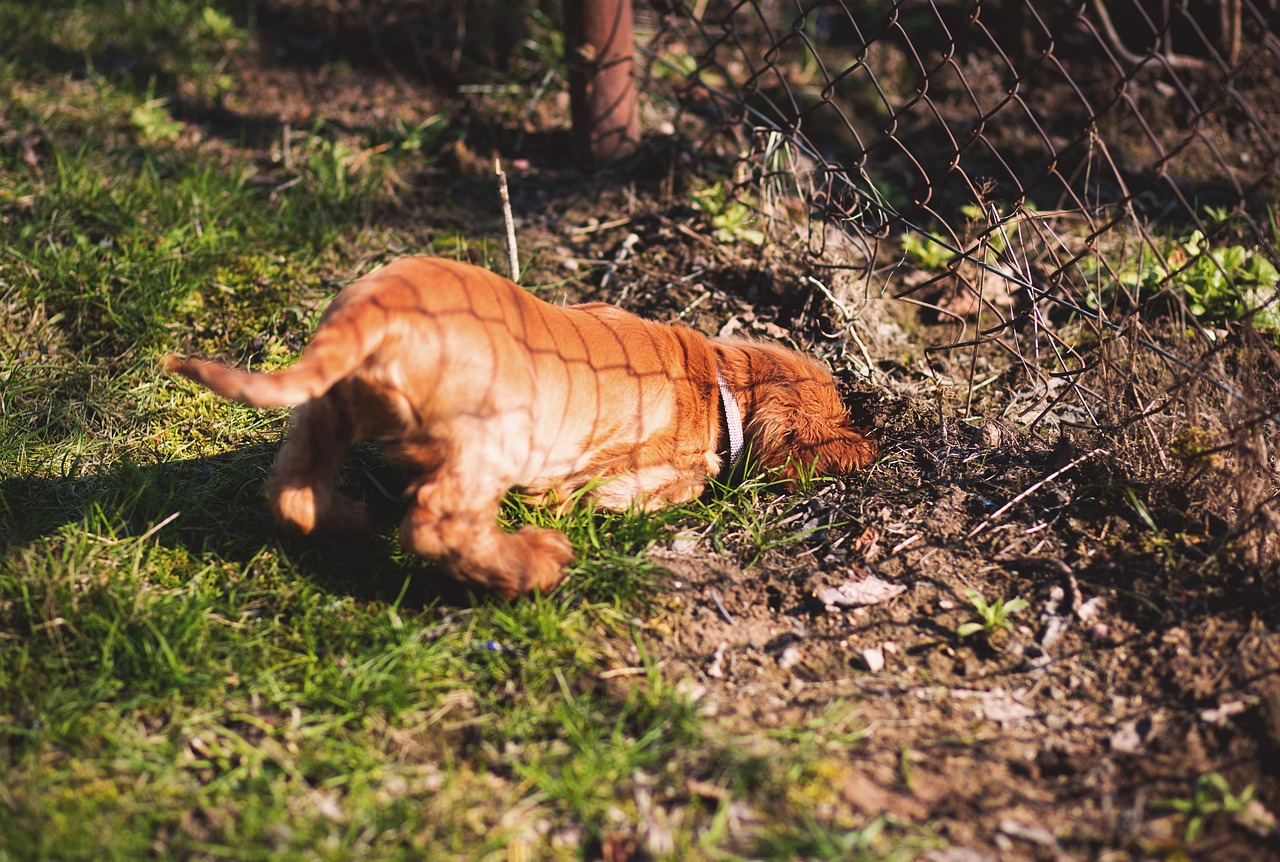Well, well, well! Congratulations on becoming the proud owner of a furry little land excavator! You thought you were getting a dog, but surprise! You’ve got yourself a canine version of a backhoe operator. We’ve all been there: stepping out into the yard, only to find it looking like a scene from a war movie, with craters and trenches everywhere. But don’t fret! Your dog isn’t planning to start his own construction company. Here’s some top-notch advice (given with a dollop of humor) to prevent your fur baby from remodeling your yard.
1. Understand the “Why?”
To deal with a digging dog, we must first think like a digging dog. Ask yourself, “Why is my dog suddenly trying to find China from my backyard?” There are a few reasons:
- Boredom: Imagine having nothing to do all day except watching the same squirrel run up the same tree. I’d dig to China too. Make sure your pooch has enough toys, interaction, and mental stimulation.
- Hunting Prey: No, your dog hasn’t watched too many National Geographic documentaries. They might be after moles, bugs, or other underground critters. It’s like their version of a treasure hunt!
- Comfort and Protection: Believe it or not, holes can be cozy. They might be looking for a cooler spot on a hot day or shelter from the wind. Alternatively, they could be preparing for the impending zombie apocalypse. You never know.
2. Give Them Their Own “Construction Zone”
You’ve heard of a sandbox for kids? How about a digging box for dogs? (Yep, it’s a thing.) Delimit an area of the yard and fill it with soft sand or dirt. Hide toys and treats to make it the premier digging spot. It’s like giving them their own little beach. Who wouldn’t want that?
3. Distractions, Distractions, Distractions!
Is your dog a multitasker? I didn’t think so. Keeping them engaged can prevent unwanted lawn renovations. Tug-of-war, fetch, or even a Kong filled with peanut butter can make them forget about their digging aspirations.
4. Consider a Doggy Spa Day
Ever thought about why we humans go to the spa? Relaxation, right? Dogs also enjoy feeling pampered! Set up a kiddie pool for them to splash in. The water can not only help them cool off but also deter them from digging, unless, of course, they’re trying to create a fancy water feature for their spa.
5. Training: A Dog’s Best Friend (After Treats)
This is where you get to show off your inner dog whisperer. Teach them the “leave it” command. Every time they start to dig, use the command, and reward them for listening. And if they don’t? Just remember that Rome wasn’t built in a day – and it certainly didn’t have any dogs trying to dig it up.
6. Play Detective with Their Diet
Did you ever think that digging could be due to a diet deficiency? Sometimes dogs dig because they’re lacking certain minerals. Before you consider changing your dog’s name to Digger McDigface, maybe check with your vet. You know, just in case they’re not trying to re-enact “The Great Escape” and simply need a little dietary tweak.
7. The Power of Plants
Here’s a fun fact: some dogs don’t like the smell of certain plants. Planting rosemary, citronella, or even marigolds might deter them from digging. It’s like Mother Nature’s version of a “Keep Out” sign. And if nothing else, at least your garden will look and smell nice when the neighbors come over to complain about the mysterious holes in their yards.
8. More Paws on Deck
Have you ever thought of getting your dog a playmate? No, not a mole or a gopher, but another dog. Sometimes, a second dog can help burn off that excess energy. On the other hand, there’s also a possibility you’ll end up with two digging machines. But hey, on the bright side, twice the fun, right?
9. Barrier Tactics
If you notice your pup always digs in the same spot, it’s time to get a little sneaky. Bury some chicken wire a couple of inches below the surface (ensuring the sharp ends are turned in). Dogs don’t like the feel of it on their paws. Or, if you’re feeling extra devious, place some of their poop in the holes they’ve already dug. Dogs aren’t fans of digging up their own business.
10. A Little Bit of Tech
In the age of tech, there are motion-activated sprinklers. They’re like security guards for your lawn. Dog starts to dig? Boom! Sprinkler turns on. Not only does your dog get deterred, but they also get a surprise mini-shower. Refreshing and effective!
In Conclusion:
Whether you’re trying to preserve your garden’s aesthetics, or simply prevent a twisted ankle due to canine-induced land mines, remember – understanding and patience are key. No method is a one-size-fits-all, so it might take some experimenting. And always remember, behind those mischievous paws is a loving doggo that just wants to have fun (even if it’s at the expense of your beautiful lawn).
Remember, a little humor, a sprinkle of creativity, and a dash of persistence go a long way. And who knows, with these tips, your dog might just give up on their dream of becoming the next great archeologist and settle for being your loving, non-digging companion. Happy non-digging!
Pro Tips to Save Your Yard (and Your Nerves):
- Rotate Toys: Just like kids get bored with the same old toys, so do dogs. Regularly switch out their toys to keep things fresh and engaging. Today’s squeaky toy might be tomorrow’s old news, but bring it back in a week, and it’s the hot new thing again.
- Doggy Daycare: If you’re out all day, consider enrolling your pup in a doggy daycare once or twice a week. They’ll be so busy socializing and playing, they’ll forget they ever had a digging career.
- Regular Vet Checks: Occasionally, digging can be linked to medical issues. It’s always a good idea to have regular check-ups to ensure there’s no underlying health concern causing the behavior.
- Pawsitive Reinforcement: Celebrate the non-digging moments. Whenever your dog chooses to play or rest instead of digging, give them a treat or some praise. They’ll start associating non-digging with rewards.
- Seek Professional Help: If your dog’s digging habit is particularly persistent or seems to be a symptom of anxiety, consider consulting a professional dog trainer or behaviorist. Sometimes, it takes a village (or at least an expert) to raise a non-digger.
- Landscaping Aids: Some landscaping choices, like laying down thick mulch or heavier stones, can deter digging. Just ensure they’re safe and comfortable for your pup to walk on.
- Keep an Eye on the Sky: Some dogs are particularly sensitive to changes in the weather and may dig in response to atmospheric pressure changes. If you notice your dog digging more before a storm, it might be their quirky way of forecasting the weather!
Frequently Asked Questions (FAQs) About Dogs and Their Passion for Digging
Dogs might have various reasons for targeting one spot. It could be that they’ve sensed the scent of a buried critter, found the soil easier to dig, or just developed a habit. Try observing them or inspecting the spot for clues.
Negative reinforcement isn’t the best approach. While it might stop them momentarily, it doesn’t address the underlying cause. Plus, we want happy dogs, not scared ones! Positive reinforcement and redirection are more effective and healthier.
Just like us, dogs respond to weather changes. They might dig in summer to reach cooler soil or in the rainy season when the ground is softer. Understanding this can help you anticipate and manage their digging habits.
Anxiety-induced digging often comes with other signs. You might notice pacing, excessive barking, or other destructive behaviors. If you suspect anxiety, consider consulting a vet or professional dog behaviorist.
Absolutely! Breeds like Terriers, Huskies, and Dachshunds have a historical connection to digging, whether for hunting, working, or other purposes. Know your breed’s traits to better understand their habits.
Sometimes, despite our best efforts, some dogs are just natural diggers. Consider setting up a designated digging spot in your yard. It’s a compromise that allows your dog to indulge in their instincts without ruining your entire garden.
For small areas, replanting grass or placing sod patches can help. For larger areas, you might consider landscaping solutions like mulching, rock gardens, or creating raised flower beds.
Neutering or spaying can reduce many behaviors driven by hormones, but it’s not a guaranteed solution for digging. However, it’s always a good practice for pet health and population control.



